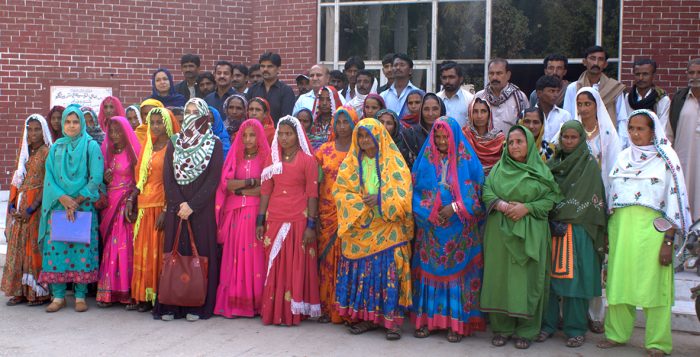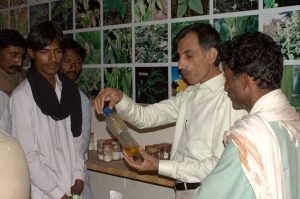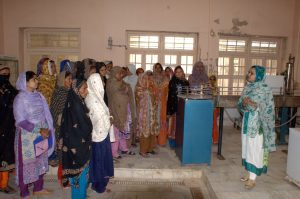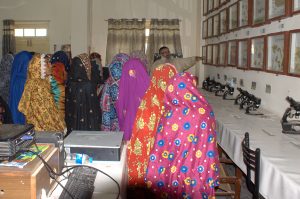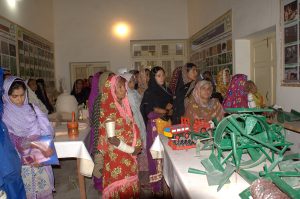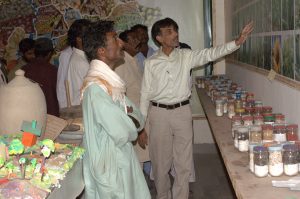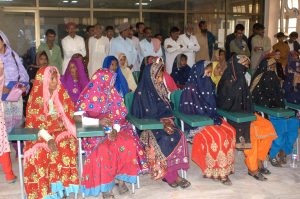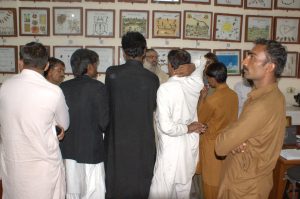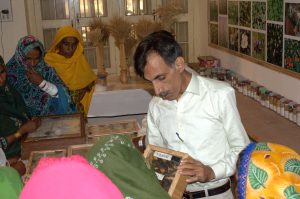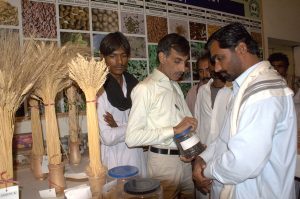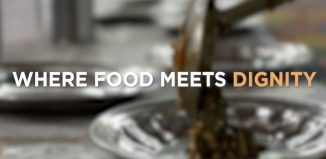Promoting Sustainable Agriculture Practices
Low productivity in agriculture is a pressing challenge in the developing world. To improve food security and increase agricultural incomes in Pakistan and neighbouring developing countries, farmers need to start adopting and using new farming techniques and tools. As part of one of our humanitarian programs, Community World Service Asia organized an exposure visit to the Sindh Agricultural University, for participating farming families of Union Council Pangrio and Khairpur Gambo of Tehsil Tando Bago, Badin district in Sindh. A total of 171 participants from 17 targeted villages along with project staff participated in this four day exposure visit in November.
Dr. Ismail Kumbhar, Director at the University and Training Coordinator and Professor of Agricultural Education Extension, saw this as a great opportunity for farmers from remote areas to be familiarized with farming innovations and modern agricultural research work. He believed that this initiative will give these farmers an opportunity to meet experts who could enhance their knowledge regarding agriculture and livestock management. Dr. Ismail also highlighted the issues faced in Sindh in the field of agriculture, such as shortage of irrigation water, irrational use of agrochemical, lack of extension services, high input rates and low prices of farm produce in Sindh, especially in District Badin. “To ensure the food security of the future generations it is vital to be self-sufficient in agriculture productivity through sustainable agriculture practices rather than waiting for tangible support from government or other institutions,” said the Professor.
He further added, “Being away from extension services and innovations, our farmers are laggard and believe in unconventional practices due to which they are becoming weaker by the day. There is a need to educate the generations and equip them with new and improved scientific farming practices.”
The farmers visited the General Laboratory and Beverage Unit of the University’s Food Technology Department where they were briefed on the importance of nutrition, use of iron for blood formation, zinc for hair falling, natural and artificial methods used in food preservation, pickle making, and natural preservations methods. The farmers found the beverage production unit very interesting as methods of improving shelf life of bakery and milk products were also explained. The visitors were also acquainted with the processes of water purification in reverse osmosis plant, mixing of sugar, adding carbon dioxide and color in a chilling unit.
Seeds samples of sixty different crops were examined by the team at the Agronomy Museum. Pictorial views of traditional and mechanized agricultural practices, models of agricultural implements and village aping were displayed at the museum.
Dr. Imtiaz Nizamani, Assistant Professor at the University, introduced the visiting participants to the students working in the Integrated Pest Management laboratory and explained how to make culture media for rearing purpose and artificial rearing of biological control agents. The participants had an opportunity to see egg parasites, trichogramma and green lacewing insects, and their use in biological pest management and how to control their infestation.
The various diseases that attack farm animals and the preventive measures taken to protect them were explained to the farmers at the department of Poultry Management, Animal Husbandry and Veterinary Sciences. Participants expressed a keen interest and inquired about the different common diseases and their remedies and techniques to improve lactation of their animals. They were introduced to the role of insects in integrated pest management and pollination at the Insect Museum. Various life stages of insects and pests and the dangers of chemical pesticides was also shared with them during their visit.
The information rick visit expanded the knowledge of the farmers in Badin on areas of livestock management and dairy technologies. The participants were given valuable advice on progressive farming, housing of farming animals, feeding and cleanliness of sheds which they will use and implement in their daily work and will pass on to many future generations.





